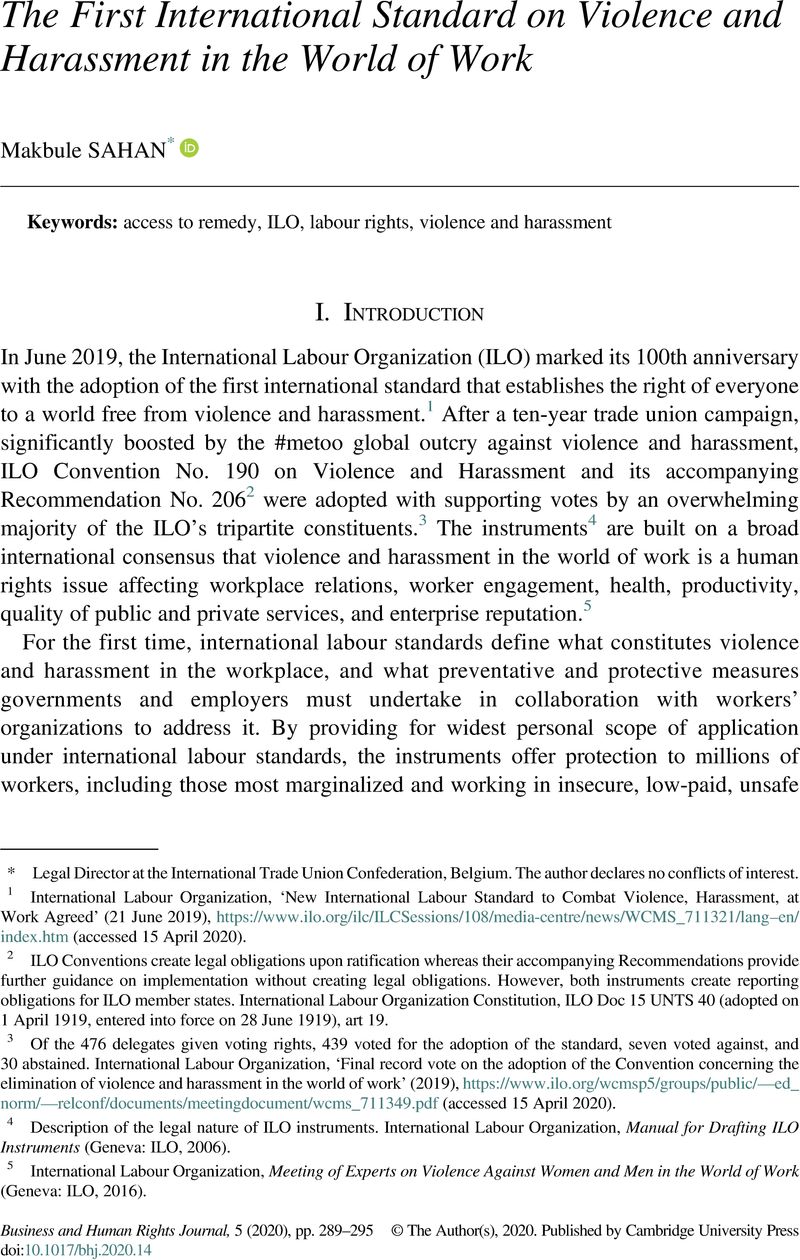Article contents
The First International Standard on Violence and Harassment in the World of Work
Published online by Cambridge University Press: 09 July 2020
Abstract

- Type
- Developments in the Field
- Information
- Copyright
- © The Author(s), 2020. Published by Cambridge University Press
Footnotes
Legal Director at the International Trade Union Confederation, Belgium. The author declares no conflicts of interest.
References
1 ILO, ‘108th International Labour Conference’ (21 June 2019), https://www.ilo.org/ilc/ILCSessions/108/media-centre/news/WCMS_711321/lang--en/index.htm (accessed 15 April 2020).
2 ILO Conventions create legal obligations upon ratification whereas their accompanying Recommendations provide further guidance on implementation without creating legal obligations. However, both instruments create reporting obligations for ILO member states. Constitution of the ILO, 1 April 1919, 15 UNTS 40 (entered into force 28 June 1919), art 19.
3 Of the 476 delegates given voting rights, 439 voted for the adoption of the standard, seven voted against, and 30 abstained. Final record vote on the adoption of the Convention concerning the elimination of violence and harassment in the world of work, ‘Meeting documents’ ILO, https://www.ilo.org/wcmsp5/groups/public/---ed_norm/---relconf/documents/meetingdocument/wcms_711349.pdf (accessed 15 April 2020).
4 For a description of the legal nature of ILO instruments: ILO Office of the Legal Advisor, ‘Appendix 1, ‘Manual for drafting ILO instruments’ (Geneva: ILO, 2006), https://www.ilo.org/wcmsp5/groups/public/---dgreports/---jur/documents/publication/wcms_426015.pdf (accessed 15 April 2020).
5 ILO, ‘Background paper for discussion at the Meeting of Experts on Violence against Women and Men in the World of Work’ (3–6 October 2016).
6 ILO Conditions of Work and Equality Department, ‘Report V(1) Ending Violence and Harassment Against Women and Men in the World of Work’, paper presented at the International Labour Conference, 107th Session, organized by the ILO in 2018.
7 ‘Gender Dimensions of the Guiding Principles on Business and Human Rights’, Working Group on the issue of human rights and transnational corporations and other business enterprises A/HRC/41/43, 24 June–12 July 2019 (accessed on 15 April 2020).
8 ILO, Women at Work Trends (Geneva, Switzerland: ILO, 2016).
9 European Foundation for the Improvement of Living and Working Conditions, ‘Sixth European Working Conditions Survey: Overview Report’ (Luxembourg: Publications Office of the European Union, 2016) 68.
10 Another example includes art 3(a) and (c) of the Worst Forms of Child Labour Convention, 1999 (No. 182), which prohibits the physical, psychological and sexual abuse of children in armed conflict. ILO Convention on the Worst Forms of Child Labour, No. 182 (adopted 17 June 1999, entered into force 19 November 2000), art 3(a) and (c).
11 ILO, ‘Report V(1) Ending Violence and Harassment Against Women and Men in the World of Work’, 33, presented at the International Labour Conference, 107th Session, organized by the ILO in 2018.
12 Other examples that call for comprehensive policies for workers in the informal economy, including with regard to gender-based violence, include: ILO Recommendation, Transition from the Informal to the Formal Economy Recommendation, No. 204 (adopted 12 June 2015) [para 11(f)].
13 Working Group on the issue of human rights and transnational corporations and other business enterprises, ‘Gender dimensions of the Guiding Principles on Business and Human Rights Annex: Gender Guidance for the Guiding Principles on Business and Human Rights’, A/HRC/41/43, 24 June–12 July 2019 (accessed 15 April 2020).
14 ILO, ‘Giving Globalization a Human Face, General Survey on the Fundamental Conventions Concerning Rights at Work in Light of the ILO Declaration on Social Justice for a Fair Globalization’, Report III (Part 1B) (2008), para 792.
15 Sergio Gamonal and Luis Ugarte, ‘Sexual and Moral Harassment in the Workplace’, presented at the 20th World Congress of Labour and Social Security Law in 2012, 28.
16 IUF – IndustriAll – Unilever ‘Joint Commitment on preventing sexual harassment’, http://www.iuf.org/w/sites/default/files/SIGNED_IUF-IA-UnileverSexualHarassmentJointCommitment-e_0.pdf (accessed 15 April 2020).
17 ‘Lesotho Plan has all Elements to End GBV at Work’, Solidarity Center (20 August 2019), https://www.solidaritycenter.org/lesotho-plan-has-all-elements-to-end-gbv-at-work/ (accessed 15 April 2020).
18 ILO memorandum submitted to the International Court of Justice (ICJ) in the Advisory Opinion Concerning Reservations to the Convention on the Prevention and Punishment of the Crime of Genocide, ICJ, 1951, para 20; ILO Office of the Legal Advisor, ‘Appendix 1, Manual for drafting ILO instruments, ILO Publications (2006), https://www.ilo.org/wcmsp5/groups/public/---dgreports/---jur/documents/publication/wcms_426015.pdf (accessed 15 April 2020), 46.
19 ILO, Non-Standard Employment Around the World: Understanding Challenges, Shaping Prospects (Geneva, Switzerland: ILO, 2016).
- 5
- Cited by


